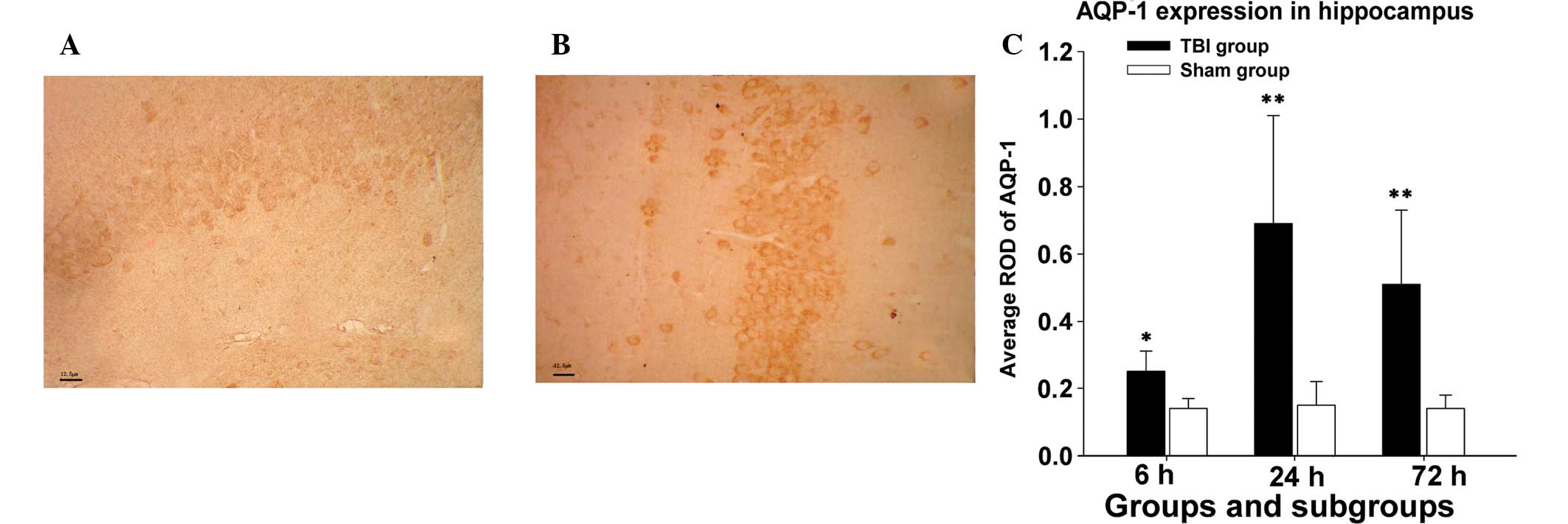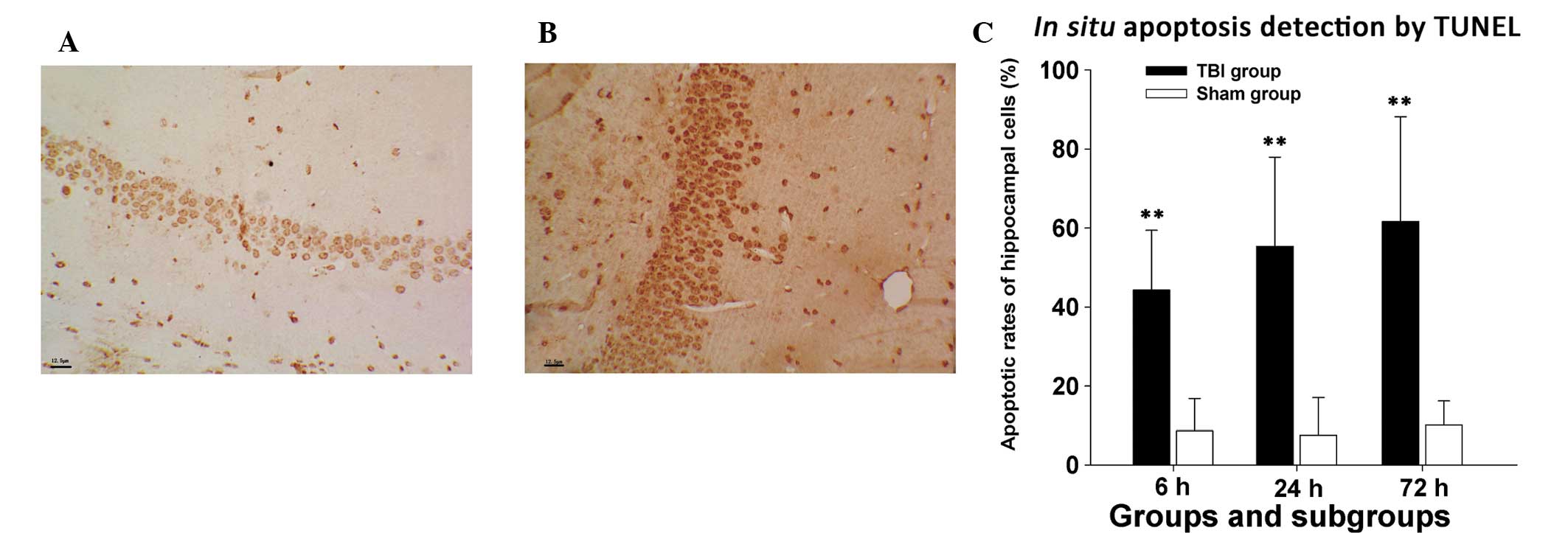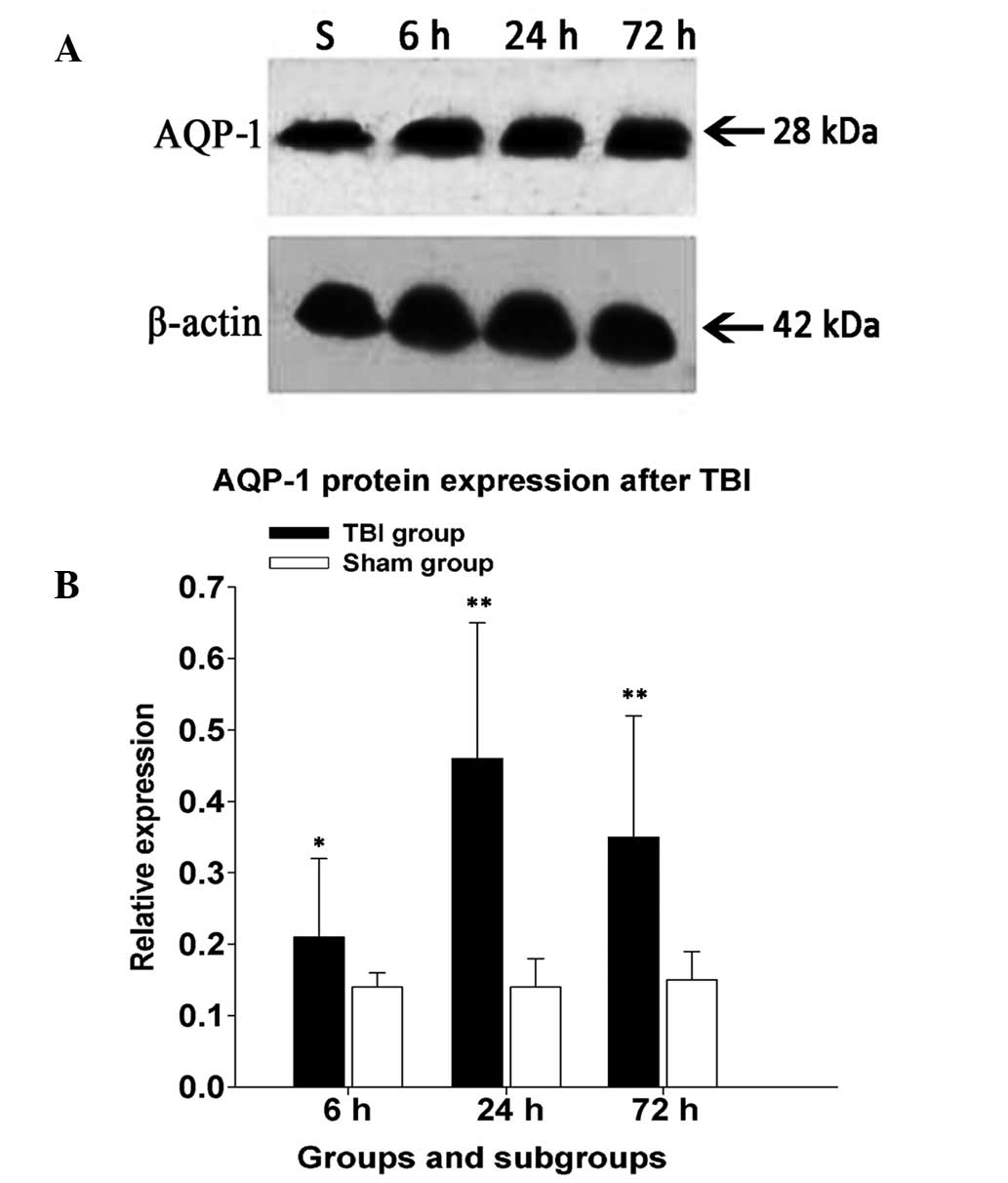|
1
|
Greve MW and Zink BJ: Pathophysiology of
traumatic brain injury. Mt Sinai J Med. 76:97–104. 2009. View Article : Google Scholar
|
|
2
|
Borgens RB and Liu-Snyder P: Understanding
secondary injury. Q Rev Biol. 87:89–127. 2012. View Article : Google Scholar
|
|
3
|
Werner C and Engelhard K: Pathophysiology
of traumatic brain injury. Br J Anaesth. 99:4–9. 2007. View Article : Google Scholar
|
|
4
|
Padayachy LC, Rohlwink U, Zwane E, Fieggen
G, Peter JC and Figaji AA: The frequency of cerebral
ischemia/hypoxia in pediatric severe traumatic brain injury. Childs
Nerv Syst. 28:1911–1918. 2012. View Article : Google Scholar : PubMed/NCBI
|
|
5
|
Walcott BP, Kahle KT and Simard JM: Novel
treatment targets for cerebral edema. Neurotherapeutics. 9:65–72.
2012. View Article : Google Scholar : PubMed/NCBI
|
|
6
|
Adeva MM, Souto G, Donapetry C, Portals M,
Rodriguez A and Lamas D: Brain edema in diseases of different
etiology. Neurochem Int. 61:166–174. 2012. View Article : Google Scholar : PubMed/NCBI
|
|
7
|
Marmarou A: A review of progress in
understanding the pathophysiology and treatment of brain edema.
Neurosurg Focus. 22:E12007. View Article : Google Scholar : PubMed/NCBI
|
|
8
|
Schmidt-Kastner R and Freund TF: Selective
vulnerability of the hippocampus in brain ischemia. Neuroscience.
40:599–636. 1991. View Article : Google Scholar : PubMed/NCBI
|
|
9
|
Royo NC, Conte V, Saatman KE, et al:
Hippocampal vulnerability following traumatic brain injury: a
potential role for neurotrophin-4/5 in pyramidal cell
neuroprotection. Eur J Neurosci. 23:1089–1102. 2006. View Article : Google Scholar : PubMed/NCBI
|
|
10
|
Deng P and Xu ZC: Contribution of Ih to
neuronal damage in the hippocampus after traumatic brain injury in
rats. J Neurotrauma. 28:1173–1183. 2011. View Article : Google Scholar : PubMed/NCBI
|
|
11
|
Nawashiro H, Shima K and Chigasaki H:
Selective vulnerability of hippocampal CA3 neurons to hypoxia after
mild concussion in the rat. Neurol Res. 17:455–460. 1995.PubMed/NCBI
|
|
12
|
Kawamata T, Katayama Y, Tsuji N and
Nishimoto H: Metabolic derangements in interstitial brain edema
with preserved blood flow: selective vulnerability of the
hippocampal CA3 region in rat hydrocephalus. Acta Neurochir Suppl.
86:545–547. 2003.PubMed/NCBI
|
|
13
|
Deng W, Aimone JB and Gage FH: New neurons
and new memories: how does adult hippocampal neurogenesis affect
learning and memory? Nat Rev Neurosci. 11:339–350. 2010. View Article : Google Scholar : PubMed/NCBI
|
|
14
|
Eichenbaum H: Hippocampus: cognitive
processes and neural representations that underlie declarative
memory. Neuron. 44:109–120. 2004. View Article : Google Scholar : PubMed/NCBI
|
|
15
|
Kim JE, Ryu HJ, Yeo SI, et al:
Differential expressions of aquaporin subtypes in astroglia in the
hippocampus of chronic epileptic rats. Neuroscience. 163:781–789.
2009. View Article : Google Scholar : PubMed/NCBI
|
|
16
|
Zelenina M: Regulation of brain
aquaporins. Neurochem Int. 57:468–488. 2010. View Article : Google Scholar
|
|
17
|
Tran ND, Kim S, Vincent HK, et al:
Aquaporin-1-mediated cerebral edema following traumatic brain
injury: effects of acidosis and corticosteroid administration. J
Neurosurg. 112:1095–1104. 2010. View Article : Google Scholar : PubMed/NCBI
|
|
18
|
Badaut J, Lasbennes F, Magistretti PJ and
Regli L: Aquaporins in brain: distribution, physiology, and
pathophysiology. J Cereb Blood Flow Metab. 22:367–378. 2002.
View Article : Google Scholar : PubMed/NCBI
|
|
19
|
Kim J and Jung Y: Increased aquaporin-1
and Na+-K+-2Cl− cotransporter 1
expression in choroid plexus leads to blood-cerebrospinal fluid
barrier disruption and necrosis of hippocampal CA1 cells in acute
rat models of hyponatremia. J Neurosci Res. 90:1437–1444. 2012.
|
|
20
|
Ameli PA, Madan M, Chigurupati S, Yu A,
Chan SL and Pattisapu JV: Effect of acetazolamide on aquaporin-1
and fluid flow in cultured choroid plexus. Acta Neurochir Suppl.
113:59–64. 2012. View Article : Google Scholar : PubMed/NCBI
|
|
21
|
Suzuki R, Okuda M, Asai J, et al:
Astrocytes co-express aquaporin-1, -4, and vascular endothelial
growth factor in brain edema tissue associated with brain
contusion. Acta Neurochir Suppl. 96:398–401. 2006. View Article : Google Scholar : PubMed/NCBI
|
|
22
|
Chen Y, Constantini S, Trembovler V,
Weinstock M and Shohami E: An experimental model of closed head
injury in mice: pathophysiology, histopathology, and cognitive
deficits. J Neurotrauma. 13:557–568. 1996.PubMed/NCBI
|
|
23
|
Albert-Weißenberger C, Várrallyay C,
Raslan F, Kleinschnitz C and Sirén AL: An experimental protocol for
mimicking pathomechanisms of traumatic brain injury in mice. Exp
Transl Stroke Med. 4:12012.PubMed/NCBI
|
|
24
|
Shapira Y, Shohami E, Sidi A, Soffer D,
Freeman S and Cotev S: Experimental closed head injury in rats:
mechanical, pathophysiologic, and neurologic properties. Crit Care
Med. 16:258–265. 1988. View Article : Google Scholar : PubMed/NCBI
|
|
25
|
Qiu B, Sun X, Zhang D, Wang Y, Tao J and
Ou S: TRAIL and paclitaxel synergize to kill U87 cells and
U87-derived stem-like cells in vitro. Int J Mol Sci.
13:9142–9156. 2012. View Article : Google Scholar : PubMed/NCBI
|
|
26
|
Stoica BA and Faden AI: Cell death
mechanisms and modulation in traumatic brain injury.
Neurotherapeutics. 7:3–12. 2010. View Article : Google Scholar : PubMed/NCBI
|
|
27
|
Eisenberg HM, Gary HE Jr, Aldrich EF, et
al: Initial CT findings in 753 patients with severe head injury. A
report from the NIH Traumatic Coma Data Bank. J Neurosurg.
73:688–698. 1990. View Article : Google Scholar : PubMed/NCBI
|
|
28
|
Donkin JJ and Vink R: Mechanisms of
cerebral edema in traumatic brain injury: therapeutic developments.
Curr Opin Neurol. 23:293–299. 2010. View Article : Google Scholar : PubMed/NCBI
|
|
29
|
Barzó P, Marmarou A, Fatouros P, Hayasaki
K and Corwin F: Contribution of vasogenic and cellular edema to
traumatic brain swelling measured by diffusion-weighted imaging. J
Neurosurg. 87:900–907. 1997.PubMed/NCBI
|
|
30
|
Ito J, Marmarou A, Barzó P, Fatouros P and
Corwin F: Characterization of edema by diffusion-weighted imaging
in experimental traumatic brain injury. J Neurosurg. 84:97–103.
1996. View Article : Google Scholar : PubMed/NCBI
|
|
31
|
Unterberg AW, Stover J, Kress B and
Kiening KL: Edema and brain trauma. Neuroscience. 129:1021–1029.
2004. View Article : Google Scholar : PubMed/NCBI
|
|
32
|
Verkman AS, Yang B, Song Y, Manley GT and
Ma T: Role of water channels in fluid transport studied by
phenotype analysis of aquaporin knockout mice. Exp Physiol. 85(Spec
No): 233S–241S. 2000. View Article : Google Scholar : PubMed/NCBI
|
|
33
|
Badaut J, Hirt L, Granziera C,
Bogousslavsky J, Magistretti PJ and Regli L: Astrocyte-specific
expression of aquaporin-9 in mouse brain is increased after
transient focal cerebral ischemia. J Cereb Blood Flow Metab.
21:477–482. 2001. View Article : Google Scholar : PubMed/NCBI
|
|
34
|
Badaut J: Aquaglyceroporin 9 in brain
pathologies. Neuroscience. 168:1047–1057. 2010. View Article : Google Scholar
|
|
35
|
Wang Q, Ishikawa T, Michiue T, Zhu BL,
Guan DW and Maeda H: Molecular pathology of pulmonary edema after
injury in forensic autopsy cases. Int J Legal Med. 126:875–882.
2012. View Article : Google Scholar : PubMed/NCBI
|
|
36
|
Kobayashi H, Minami S, Itoh S, et al:
Aquaporin subtypes in rat cerebral microvessels. Neurosci Lett.
297:163–166. 2001. View Article : Google Scholar : PubMed/NCBI
|
|
37
|
Badaut J, Brunet JF, Grollimund L, et al:
Aquaporin 1 and aquaporin 4 expression in human brain after
subarachnoid hemorrhage and in peritumoral tissue. Acta Neurochir
Suppl. 86:495–498. 2003.PubMed/NCBI
|
|
38
|
Satoh J, Tabunoki H, Yamamura T, Arima K
and Konno H: Human astrocytes express aquaporin-1 and aquaporin-4
in vitro and in vivo. Neuropathology. 27:245–256. 2007. View Article : Google Scholar : PubMed/NCBI
|
|
39
|
Jablonski EM, Webb AN, McConnell NA, Riley
MC and Hughes FM Jr: Plasma membrane aquaporin activity can affect
the rate of apoptosis but is inhibited after apoptotic volume
decrease. Am J Physiol Cell Physiol. 286:C975–985. 2004.PubMed/NCBI
|
|
40
|
Kim J and Jung Y: Different expressions of
AQP1, AQP4, eNOS, and VEGF proteins in ischemic versus non-ischemic
cerebropathy in rats: potential roles of AQP1 and eNOS in
hydrocephalic and vasogenic edema formation. Anat Cell Biol.
44:295–303. 2011. View Article : Google Scholar : PubMed/NCBI
|
|
41
|
Blank ME and Ehmke H: Aquaporin-1 and
HCO3(−)-Cl− transporter-mediated transport of
CO2 across the human erythrocyte membrane. J Physiol.
550:419–429. 2003.PubMed/NCBI
|
|
42
|
Staub F, Winkler A, Haberstok J, et al:
Swelling, intracellular acidosis, and damage of glial cells. Acta
Neurochir Suppl. 66:56–62. 1996.PubMed/NCBI
|
|
43
|
Ringel F, Plesnila N, Chang RC, Peters J,
Staub F and Baethmann A: Role of calcium ions in acidosis-induced
glial swelling. Acta Neurochir Suppl. 70:144–147. 1997.PubMed/NCBI
|
|
44
|
Plesnila N, Haberstok J, Peters J, Kolbl
I, Baethmann A and Staub F: Effect of lactacidosis on cell volume
and intracellular pH of astrocytes. J Neurotrauma. 16:831–841.
1999.PubMed/NCBI
|
|
45
|
Ringel F, Chang RC, Staub F, Baethmann A
and Plesnila N: Contribution of anion transporters to the
acidosis-induced swelling and intracellular acidification of glial
cells. J Neurochem. 75:125–132. 2000. View Article : Google Scholar : PubMed/NCBI
|

















